Queer Lives: Narrations of Work Abroad (June 5)

Not every day is groundbreaking. Some are; some days, I can map out the progression from hour to hour with surgical exactness, because each minute feels immediately meaningful. My first day in Bandra, starting a new project, meeting a friend after ten years; those days are impossible to ignore. But most days are far quieter, a soft thread drawn through simple moments – the kind of day that allows you to while away hours sitting in a cafe, or exploring the side roads of a small suburb, or even just sitting on the couch with a new book.
Today is one of those days, and it’s honestly a challenge to write about. When there’s a lot going on, it’s easier to reminisce on new events and concurrent feelings and the general motion of it all, but it’s far harder when the movement stills. So instead of telling you about all the things I did today, let me tell you, once again, about my favourite part of the city. I’ve spent countless words on it already, but I still don’t believe I’ve captured it well enough. A day like this, though, forces presence – there's nothing to do but breathe in the place fully, and notice every detail, the crooked road sign leading to my favourite cafe and the cats perched in the cradle of motorcycles. A general, everyday poetry in life.
So, then, let me tell you. Close your eyes and picture a crowded street, dusty with heat and the rumble of a hundred-odd cars. Two lanes, one in each direction, split apart by a rough concrete partition. Framing it all is a cracked stone sidewalk, a deep grey punctured by the morning green of summer plants. It is impossible to move without running into something: a dog curled up roadside, or a vendor asleep behind his stall, or young children running frantically across the road with a boldness that makes my heart seize. Every inch of the street is covered – in bookstores and street stalls and autos and people, everywhere, people. One man, perched underneath a tree, hums an old Hindi tune I can just recognise if I try hard enough; another splashes water on his face to rid himself of the blanketing heat. The air feels heavy, choked by the sheer density of the place. Welcome to Hill Road, one of the most frequented shopping areas of Mumbai, and certainly one of the busiest.
But now, take a step just off to the side, into a shaded alley you probably didn’t see until you set foot in it. Walk just a few more feet, and suddenly, you’re entirely hidden. Everything is silent, spare sparse birdsong and the low shuffle of footsteps. Trees tower tall above me, curved away from the sun. Slow waves of people move through the street, and the watchmen – a family of tabby cats – keep an eye from above. Just seconds from the heart of Bandra, Waroda Road seems a world of its own, sheltered from the chaos taking place only metres away. My first time here, I said that I felt that time slowed down: a year later, the same thought comes to mind. Seconds drag as I stroll through the street, staring at the brightly coloured doorframe and old-fashioned windows. In the silence, sounds of life slowly emerge: the faraway shouts of children playing, the metal clang of a dropped pot, the mechanical purr of an engine.
Bits of history sit in each street corner. Waroda Road is one of the older parts of the city, and it still carries a visible imprint of colonial Catholic rule. Walking through the street feels like walking through time: there are moments I feel as if I could be here fifty, hundred, two hundred years ago, and nothing would seem different. One stall, a bookstore that is essentially several precariously balanced stacks of paperbacks, is barely tall enough for me to enter. Another, a bright coral cafe selling only sandwiches, practically begs entrance. Each doorway has a story to tell, I’m certain, and I want to know them all.
However, unlike the last time I was here, I have a goal – Subko Cafe. Last year, I promised that Subko Cafe was my favourite spot in Mumbai, and now I can confirm it still is. The afternoon is blindingly sunny, and the temperature has creeped up from the gentle coolness of morning, and I am eager to rush inside into the joy that is air conditioning in India summer. The building itself deserves description, though: a three-story, nearly hidden bungalow, with earth-toned stairs and deep green walls that blend in with the trees. Sat on the top floor, alternating between a cold brew tonic and a rich, steaming cup of hot chocolate, I am beyond content.
It’s also lovely to have an afternoon to chat with Revathi Auntie. Although we’ve obviously been talking often at meals, and in the morning, and even sometimes into the late hours of night, there’s a timelessness in cafes which encourages conversation; a dialogue which may in fact span several hours feels like only minutes. I tell her about St Andrews: our wacky, firelit processions, dramatic academic weddings, and sunrise runs into the sea. She tells me about Mumbai: how it’s changed in the last few years from the city that she fell in love with young, for better and for worse. It is easy to spend hours there, lost in her tales and in my seemingly never-ending hot chocolate.
My first forays into Waroda Road, I was overwhelmed by the explosion of colours, taken aback by the sudden stillness that sets in the moment you enter. This time, I am in step with it, attuned to the slow rhythms of this much quieter, nearly understated side of the city. It is still, by far, the place I feel happiest in Mumbai. So, if you need to find me, take the left off Hill Road, and follow the directions from the old man sitting on the white-wood porch. He’ll tell you how to get here – a right, two lefts, another right. Look for the yellow sign, and come upstairs. I’ll save you a seat.
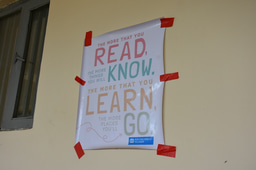
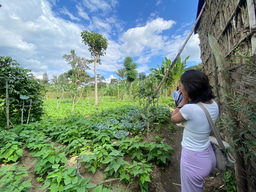
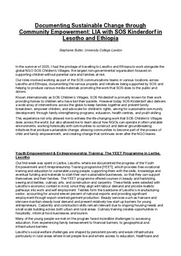
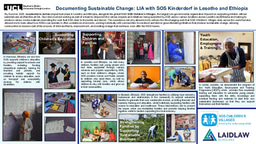
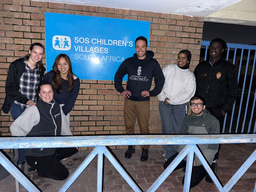
Please sign in
If you are a registered user on Laidlaw Scholars Network, please sign in